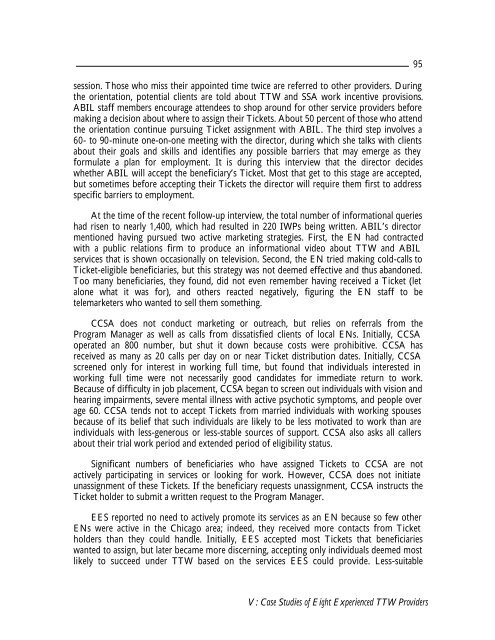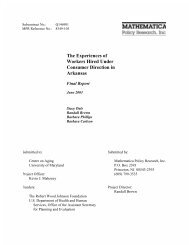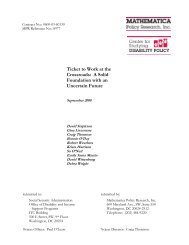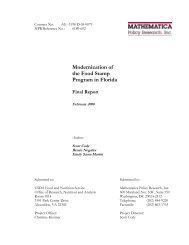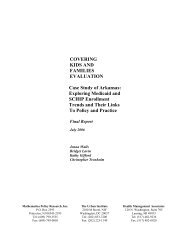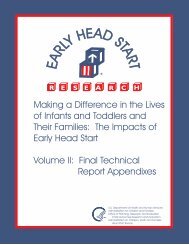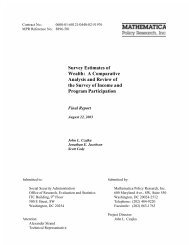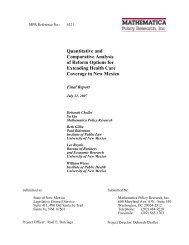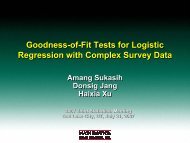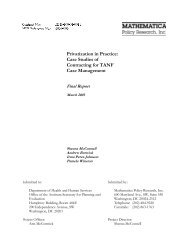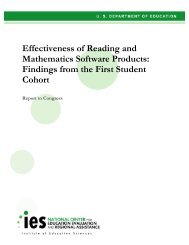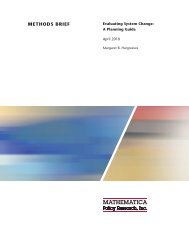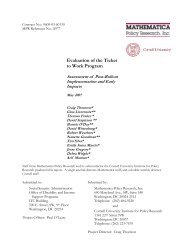Evaluation of the Ticket to Work Program Initial Evaluation Report
Evaluation of the Ticket to Work Program Initial Evaluation Report
Evaluation of the Ticket to Work Program Initial Evaluation Report
Create successful ePaper yourself
Turn your PDF publications into a flip-book with our unique Google optimized e-Paper software.
session. Those who miss <strong>the</strong>ir appointed time twice are referred <strong>to</strong> o<strong>the</strong>r providers. During<br />
<strong>the</strong> orientation, potential clients are <strong>to</strong>ld about TTW and SSA work incentive provisions.<br />
ABIL staff members encourage attendees <strong>to</strong> shop around for o<strong>the</strong>r service providers before<br />
making a decision about where <strong>to</strong> assign <strong>the</strong>ir <strong>Ticket</strong>s. About 50 percent <strong>of</strong> those who attend<br />
<strong>the</strong> orientation continue pursuing <strong>Ticket</strong> assignment with ABIL. The third step involves a<br />
60- <strong>to</strong> 90-minute one-on-one meeting with <strong>the</strong> direc<strong>to</strong>r, during which she talks with clients<br />
about <strong>the</strong>ir goals and skills and identifies any possible barriers that may emerge as <strong>the</strong>y<br />
formulate a plan for employment. It is during this interview that <strong>the</strong> direc<strong>to</strong>r decides<br />
whe<strong>the</strong>r ABIL will accept <strong>the</strong> beneficiary’s <strong>Ticket</strong>. Most that get <strong>to</strong> this stage are accepted,<br />
but sometimes before accepting <strong>the</strong>ir <strong>Ticket</strong>s <strong>the</strong> direc<strong>to</strong>r will require <strong>the</strong>m first <strong>to</strong> address<br />
specific barriers <strong>to</strong> employment.<br />
At <strong>the</strong> time <strong>of</strong> <strong>the</strong> recent follow-up interview, <strong>the</strong> <strong>to</strong>tal number <strong>of</strong> informational queries<br />
had risen <strong>to</strong> nearly 1,400, which had resulted in 220 IWPs being written. ABIL’s direc<strong>to</strong>r<br />
mentioned having pursued two active marketing strategies. First, <strong>the</strong> EN had contracted<br />
with a public relations firm <strong>to</strong> produce an informational video about TTW and ABIL<br />
services that is shown occasionally on television. Second, <strong>the</strong> EN tried making cold-calls <strong>to</strong><br />
<strong>Ticket</strong>-eligible beneficiaries, but this strategy was not deemed effective and thus abandoned.<br />
Too many beneficiaries, <strong>the</strong>y found, did not even remember having received a <strong>Ticket</strong> (let<br />
alone what it was for), and o<strong>the</strong>rs reacted negatively, figuring <strong>the</strong> EN staff <strong>to</strong> be<br />
telemarketers who wanted <strong>to</strong> sell <strong>the</strong>m something.<br />
CCSA does not conduct marketing or outreach, but relies on referrals from <strong>the</strong><br />
<strong>Program</strong> Manager as well as calls from dissatisfied clients <strong>of</strong> local ENs. <strong>Initial</strong>ly, CCSA<br />
operated an 800 number, but shut it down because costs were prohibitive. CCSA has<br />
received as many as 20 calls per day on or near <strong>Ticket</strong> distribution dates. <strong>Initial</strong>ly, CCSA<br />
screened only for interest in working full time, but found that individuals interested in<br />
working full time were not necessarily good candidates for immediate return <strong>to</strong> work.<br />
Because <strong>of</strong> difficulty in job placement, CCSA began <strong>to</strong> screen out individuals with vision and<br />
hearing impairments, severe mental illness with active psychotic symp<strong>to</strong>ms, and people over<br />
age 60. CCSA tends not <strong>to</strong> accept <strong>Ticket</strong>s from married individuals with working spouses<br />
because <strong>of</strong> its belief that such individuals are likely <strong>to</strong> be less motivated <strong>to</strong> work than are<br />
individuals with less-generous or less-stable sources <strong>of</strong> support. CCSA also asks all callers<br />
about <strong>the</strong>ir trial work period and extended period <strong>of</strong> eligibility status.<br />
Significant numbers <strong>of</strong> beneficiaries who have assigned <strong>Ticket</strong>s <strong>to</strong> CCSA are not<br />
actively participating in services or looking for work. However, CCSA does not initiate<br />
unassignment <strong>of</strong> <strong>the</strong>se <strong>Ticket</strong>s. If <strong>the</strong> beneficiary requests unassignment, CCSA instructs <strong>the</strong><br />
<strong>Ticket</strong> holder <strong>to</strong> submit a written request <strong>to</strong> <strong>the</strong> <strong>Program</strong> Manager.<br />
EES reported no need <strong>to</strong> actively promote its services as an EN because so few o<strong>the</strong>r<br />
ENs were active in <strong>the</strong> Chicago area; indeed, <strong>the</strong>y received more contacts from <strong>Ticket</strong><br />
holders than <strong>the</strong>y could handle. <strong>Initial</strong>ly, EES accepted most <strong>Ticket</strong>s that beneficiaries<br />
wanted <strong>to</strong> assign, but later became more discerning, accepting only individuals deemed most<br />
likely <strong>to</strong> succeed under TTW based on <strong>the</strong> services EES could provide. Less-suitable<br />
95<br />
V: Case Studies <strong>of</strong> Eight Experienced TTW Providers


